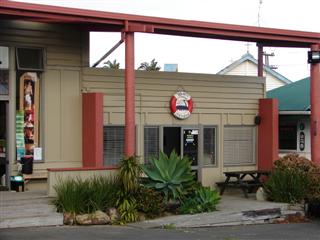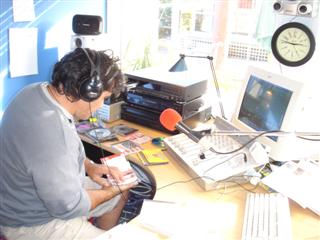Please show your support of Waihekepedia by adding a link to us from your web site. Waihekepedia T Shirts now available at the Ostend Market
Difference between revisions of "The Beach FM"
Countrymike (talk | contribs) |
Countrymike (talk | contribs) m (→Shows) |
||
| (4 intermediate revisions by the same user not shown) | |||
| Line 1: | Line 1: | ||
[[Image:Tihare_BeachRadio.JPG|frame|left|The Beach at Artworks in Oneroa]] | [[Image:Tihare_BeachRadio.JPG|frame|left|The Beach at Artworks in Oneroa]] | ||
| + | In 1999 Tony Storey a former Radio New Zealand employer who was living on Great Barrier Island placed an ad in the Gulf News looking for people to help him begin broadcasting on Waiheke Island. Storey was broadcasting on Great Barrier Island on a commercial frequency and wanted to create a small network of radio stations to cover the Hauraki Gulf and the coastal areas of greater Auckland to compete with radio broadcasters in Auckland. His plan required establishing The Beach FM, as it was called, on Waiheke, Kawau, and Great Barrier Islands. His initial setup of The Beach on Waiheke was broadcast from a caravan near the Waiheke airfield, a high point on the island, and had the transmitter attached to the top of the hanger for maximum coverage. The station was mostly aimed at playing music and transmission reached into Auckland radios along the southern shorelines, or even into housing located on the higher points of the North Shore. Storey's attempt to create a competitive gulf radio network failed to raise enough money to support any employees or even Storey himself and he eventually sold the station to another Waiheke resident, Charlie Hraske, in 2002. | ||
| − | Beach Radio was | + | |
| + | Hraske managed to garner a small income through advertising to keep The Beach running on Waiheke but still not enough to pay for any permanent staff or any of the presenters. Hraske loved the idea of radio on the island, had regular weekly meetings about station affairs, and had a regular salesperson on board. Most, if not all, presenters were volunteers and the station started to include more current affairs and local news than previous stations. In August of 2004 Hraske and three station volunteers established the Waiheke Radio Community Trust to “''provide an accessible community based broadcasting service to help fulfil the cultural, educational, and social needs of the residents of Waiheke Island''” (Waiheke Community Radio Trust, 2004). This organization lay dormant until the idea was revisited in 2008 as the basis for establishing [[Waiheke Radio]]. Hraske eventually sold the station on again later in 2004 to long time Auckland radio personality Barry Jenkins. At this time The Beach was broadcasting on a commercial frequency, 99.4 FM, that had been gained in the government tender process by Tony Storey. | ||
| + | |||
| − | The station | + | Jenkins' tenancy at the helm of The Beach lasted for two years but ultimately resulted in the end of the Beach FM brand. There were few if any advertisers on board and the reputation of the station within the community had diminished, with most considering the station as a place where people went to have a good time and indulge in their particular taste of music on-air - not necessarily to make good radio. Apart from the weekend Island Life show that had originated with Bob Mansell in the caravan days of The Beach, there was little variation in the content which consisted mostly of specialist music shows and the station had minimal community involvement besides irregular appearances at the yearly Christmas parade. As the station was being run as a commercial enterprise Auckland City charged commercial fees for the rent of the studio in [[Artworks]] in Oneroa. This cost eventually caught up with Jenkins and he attempted to relocate the station to his garage, a move that was unpopular with most presenters and which essentially signaled the end of The Beach. The frequency was auctioned off by the [http://www.waihekeradio.org.nz/node/110 Radio Spectrum Management Group] in May of 2008 for the sum of $380,000, an amount well out of reach of Jenkins or any group based on Waiheke Island for that matter. |
| + | The station broadcast on 99.4 fm or on 107 fm for the Palm Beach and Onetangi areas. | ||
| − | + | ||
| + | More about Beach Radio (former website/blog): http://waihekeradio.blogspot.com | ||
<br style="clear:both;" /> | <br style="clear:both;" /> | ||
| − | + | [[Image:Tihare_TheBeach.JPG|frame|left|DJ Rob Tuwhare in The Beach FM studio]] | |
| − | |||
| − | |||
| − | |||
| − | |||
| − | |||
| − | |||
| − | |||
| − | |||
| − | |||
| − | |||
| − | |||
| − | |||
| − | |||
| − | |||
| − | |||
| − | |||
| − | |||
| − | |||
| − | |||
| − | |||
| − | |||
| − | |||
| − | |||
| − | |||
| − | |||
| − | |||
| − | |||
| − | |||
| − | |||
| − | |||
| − | |||
| − | [[Image:Tihare_TheBeach.JPG|frame|left|The Beach studio]] | ||
<br style="clear:both;" /> | <br style="clear:both;" /> | ||
| − | |||
| − | |||
| − | |||
| − | + | == Shows == | |
| Line 67: | Line 37: | ||
[[Category:Media]] | [[Category:Media]] | ||
| − | [[Category: | + | [[Category:History]] |
Latest revision as of 02:17, 2 January 2010
In 1999 Tony Storey a former Radio New Zealand employer who was living on Great Barrier Island placed an ad in the Gulf News looking for people to help him begin broadcasting on Waiheke Island. Storey was broadcasting on Great Barrier Island on a commercial frequency and wanted to create a small network of radio stations to cover the Hauraki Gulf and the coastal areas of greater Auckland to compete with radio broadcasters in Auckland. His plan required establishing The Beach FM, as it was called, on Waiheke, Kawau, and Great Barrier Islands. His initial setup of The Beach on Waiheke was broadcast from a caravan near the Waiheke airfield, a high point on the island, and had the transmitter attached to the top of the hanger for maximum coverage. The station was mostly aimed at playing music and transmission reached into Auckland radios along the southern shorelines, or even into housing located on the higher points of the North Shore. Storey's attempt to create a competitive gulf radio network failed to raise enough money to support any employees or even Storey himself and he eventually sold the station to another Waiheke resident, Charlie Hraske, in 2002.
Hraske managed to garner a small income through advertising to keep The Beach running on Waiheke but still not enough to pay for any permanent staff or any of the presenters. Hraske loved the idea of radio on the island, had regular weekly meetings about station affairs, and had a regular salesperson on board. Most, if not all, presenters were volunteers and the station started to include more current affairs and local news than previous stations. In August of 2004 Hraske and three station volunteers established the Waiheke Radio Community Trust to “provide an accessible community based broadcasting service to help fulfil the cultural, educational, and social needs of the residents of Waiheke Island” (Waiheke Community Radio Trust, 2004). This organization lay dormant until the idea was revisited in 2008 as the basis for establishing Waiheke Radio. Hraske eventually sold the station on again later in 2004 to long time Auckland radio personality Barry Jenkins. At this time The Beach was broadcasting on a commercial frequency, 99.4 FM, that had been gained in the government tender process by Tony Storey.
Jenkins' tenancy at the helm of The Beach lasted for two years but ultimately resulted in the end of the Beach FM brand. There were few if any advertisers on board and the reputation of the station within the community had diminished, with most considering the station as a place where people went to have a good time and indulge in their particular taste of music on-air - not necessarily to make good radio. Apart from the weekend Island Life show that had originated with Bob Mansell in the caravan days of The Beach, there was little variation in the content which consisted mostly of specialist music shows and the station had minimal community involvement besides irregular appearances at the yearly Christmas parade. As the station was being run as a commercial enterprise Auckland City charged commercial fees for the rent of the studio in Artworks in Oneroa. This cost eventually caught up with Jenkins and he attempted to relocate the station to his garage, a move that was unpopular with most presenters and which essentially signaled the end of The Beach. The frequency was auctioned off by the Radio Spectrum Management Group in May of 2008 for the sum of $380,000, an amount well out of reach of Jenkins or any group based on Waiheke Island for that matter.
The station broadcast on 99.4 fm or on 107 fm for the Palm Beach and Onetangi areas.
More about Beach Radio (former website/blog): http://waihekeradio.blogspot.com
Shows
Live On The Beach
Every May, to mark NZ Music Month, The Beach presents Live On The Beach, a series featuring Waiheke musicians playing live in our studio. The series was started in 2003 and proved so popular it became an annual event. Throughout the history of Live On The Beach we have tried to showcase musicians who don't get the opportunity to perform in front of a audience on the Island whether it be because of their age, or because they are playing music that doesn't fit the solo acoustic blues format favoured by many of the local venues. Most of these performances have been recorded, and many are now available to listen to on the internet or download. Find more info and audio on The Beach Radio Blog here and here.
Alternatuis
In 2006 The Beach launched its very own music awards, The Alternatuis. Arising from concerns that mainstream NZ music awards had become predictable and lacking in adventurousness we decided to take action. The Alternatuis are given to NZ musicians that we feel deserve acclaim but aren't receiving it. The judging criteria for the awards are a strictly guarded secret but are rumoured to be completely subjective. Even the award categories change from year to year.
Winners of the 2006 Alternatuis, who didn't know until after the awards were made that they had been in the running, included Steve Abel, Dudley Benson, Chris Knox and The Mint Chicks. At least two of these artists subsequently placed Alternatui winner stickers on the front of their CD releases. Visit The Beach Radio Blog to find out about the 2006 winners and their reaction.

